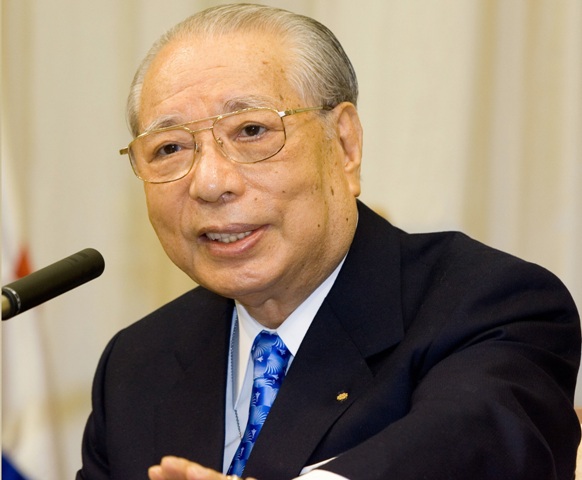TOKYO (AP) — Daisaku Ikeda, who headed Soka Gakkai, a Japanese Buddhist organization, that includes famed musician Herbie Hancock and other celebrities in its fold, has died at 95, the Japanese religious organization said Saturday.
Ikeda died on Nov. 15 at his home in Tokyo, “from natural causes,” the group said in a statement, without giving details.
Along with his two predecessors, Ikeda is credited with reviving Nichiren Buddhism in the modern age, making it more accessible for present-day practitioners by emphasizing a philosophy of goodness, respect for others and being happy and at peace.
Soka Gakkai has been set up in 192 countries, drawing more than 8 million member households in Japan and nearly 3 million people outside Japan, according to the group.
An educator, photographer and poet, Ikeda played a key role in spreading the teachings abroad, founding Soka Gakkai International in 1975.
He met Josei Toda, the second president of Soka Gokkai, during the 1950s when Ikeda was just 19. Ikeda embraced the teachings and Toda as his mentor.
Unlike some religions that emphasize the importance of suffering, Ikeda underscored the positive, speaking often of happiness.
“By helping other people become happy, we too become happy,” was an idea he often expressed. To Ikeda, happiness was about “being true to yourself,” which, he believed, allowed happiness to grow in an infinite way.
Ikeda was born in Tokyo, on Jan. 2, 1928, to a family of seaweed farmers. The horror of war he witnessed as a teen affected him deeply and the experience is believed to have made him vow to dedicate his life to peace.
The basic Buddhist practice for Soka Gakkai members is chanting portions of the sutra, or teachings of Buddha, and sharing the message with others so they can meet challenges and overcome problems, according to the organization.
Ikeda was tapped as the third president of Soka Gakkai in 1960. He led “the lay Buddhist movement” toward growth in the modern age, especially in international circles.
He founded a school system based on the religion and its values, to foster individual potential and teach the importance of peace and contributing to society. It runs from kindergarten through graduate studies and includes a university in Tokyo and California.
Besides famed jazz pianist Hancock, saxophonist and composer Wayne Shorter and drummer Kenwood Dennard have converted to Soka Gakkai.
“Even though the roots of jazz come from the African American experience, my feeling has always been that jazz really developed from a noble aspect of the human spirit common to all people, the ability to respond to the worst of circumstances and to create something of great value, or as Buddhism says, to turn poison into medicine,” Hancock said in a book about jazz and Buddhism, co-authored with Shorter and Ikeda.
Other famous Western actors, writers and sports stars have expressed interest in Soka Gakkai, including Hollywood movie stars Orlando Bloom and Kate Bosworth, as well as the late singer Tina Turner.
Ikeda often talked about being aware of the inevitability of death in everyday life, saying: “We begin to seek the eternal and become determined to make the most valuable use of each moment of life.”
Ikeda is survived by his wife Kaneko and his sons, Hiromasa and Takahiro.
A private funeral has already been held with close family. The date of a public commemorative service will be announced later, Soka Gakkai said in its statement.
___
Yuri Kageyama is on X, formerly Twitter https://twitter.com/yurikageyama





